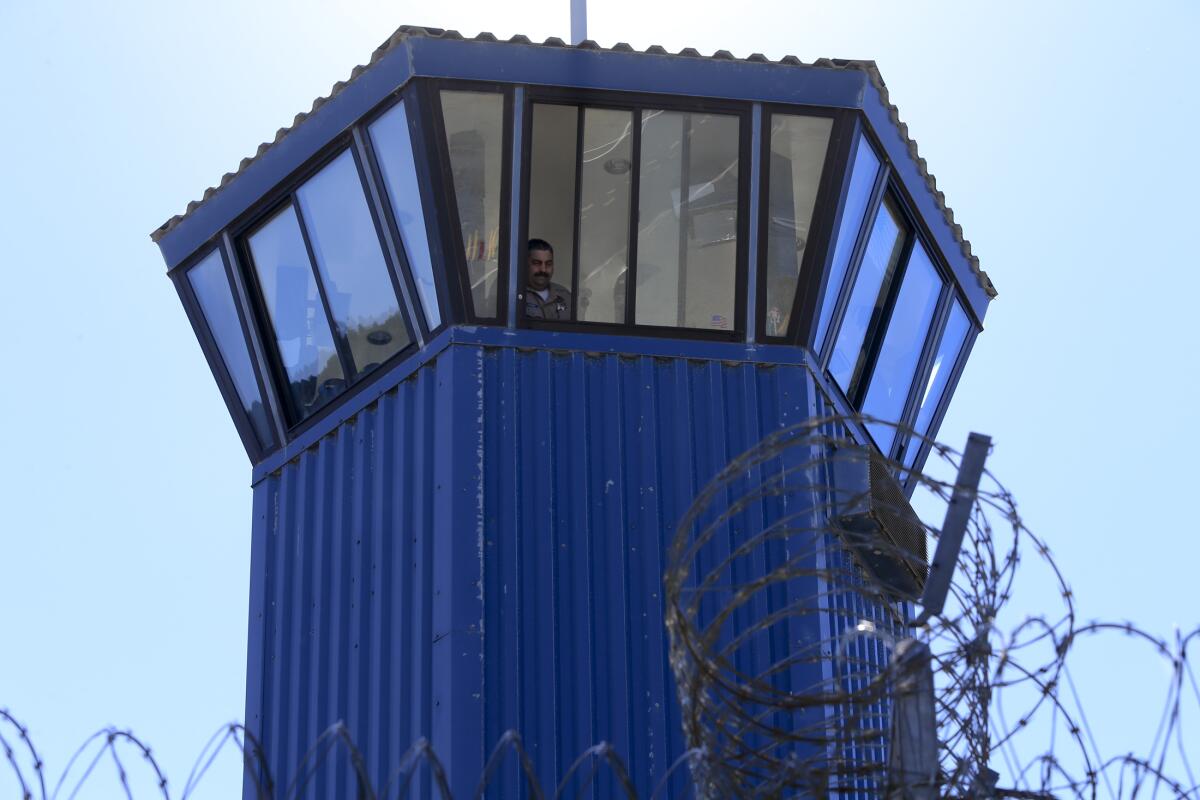Aryan Brotherhood case raises a question: How to stop killings ordered from state prisons?

- Share via
As witness after witness testified that three Aryan Brotherhood members directed drug deals, shakedowns and murders from their California prison cells, the question was not whether prosecutors would convict them — but whether doing so would prevent future crimes.
Kenneth Johnson, Francis Clement and John Stinson were already serving life sentences in the state system when a federal jury in Fresno convicted them last week of racketeering and other offenses.
Testimony delivered at the ongoing trial of three accused Aryan Brotherhood members delved into Los Angeles County’s underbelly: Cheap hotels, gambling parlors and crash pads from Lancaster to Long Beach, drug dealers and fraudsters.
During the trial, prosecutors made clear that California prisons are flooded with contraband cellphones, which gang leaders use to control rackets inside and outside their lockups.
Witnesses testified to enjoying the use of phones and drugs smuggled in using drones or by corrupt staff. Authorities seized 4,109 phones across the California prison system in 2023, the most recent year for which data were available, according to a prison spokeswoman.
The U.S. Bureau of Prisons offers stricter conditions. High-risk inmates are held in a so-called super-maximum security facility in Colorado where they have virtually no access to one another or the outside world.
Despite the convictions of Johnson, Clement and Stinson, it remains unclear whether they will leave California. They are currently held at the Fresno County Jail.

Stinson’s attorney, Kenneth Reed, said that he does not expect his client to go to federal prison after he is sentenced in May.
Reed noted three other Aryan Brotherhood members — who were also state prisoners serving life sentences — were found guilty of racketeering last year in a trial in Sacramento, but haven’t entered federal custody.
Stinson, 70, has been serving a federal life term concurrent with his state life sentence since he was first convicted of racketeering in 2007 by a Los Angeles jury.
At both the Los Angeles and Fresno trials, witnesses testified that Stinson sat on a three-man “commission” that arbitrates disputes within the Aryan Brotherhood, a group of about 30 men who control many white inmates in the California and federal prison systems.
Authorities once tried to break up prison gangs like the Aryan Brotherhood, Mexican Mafia and Nuestra Familia by convicting their leaders in federal court, then banishing them to places like ADX Florence in Colorado. Sometimes called “the Alcatraz of the Rockies,” the maximum-security prison holds convicted drug cartel leaders, terrorists, escape artists and other high-profile prisoners who the federal government has deemed pose the highest risk to the public and other inmates.
Federal prosecutors alleged Ronaldo Ayala, reputed to be a powerful member of the Mexican Mafia prison gang, conspired with the Sinaloa cartel and offered to protect its notorious former leader, Joaquín “El Chapo” Guzmán.
That prison is what Scott Kernan had in mind in 2018 when, as secretary of the California Department of Corrections and Rehabilitation, he asked a top U.S. Bureau of Prisons official to take custody of eight “extremely dangerous” prisoners.
In a letter filed in court, Kernan said the inmates included members of the Aryan Brotherhood and Mexican Mafia. Before they were indicted, the California corrections chief wanted the federal prison system’s assurance that it would be willing to accept prisoners who required “the most restrictive confinement conditions available.”
It’s unclear how federal prison officials responded, but prosecutors brought indictments against all eight inmates in 2019. All but one, who was killed while awaiting trial, were convicted of racketeering.
None have been taken to federal prison, a spokesman for the U.S. Bureau of Prisons said. The spokesman, Donald Murphy, said he wouldn’t discuss the status of inmates who weren’t in the agency’s custody.
A spokeswoman for the U.S. Attorney’s Office for the Eastern District of California, which tried the Fresno and Sacramento cases, declined to comment.
Using contraband cellphones and women that he called his ‘wives,’ a California prisoner oversaw a sprawling drug ring that spread death and addiction to the most remote corners of Alaska, prosecutors say.
In the Sacramento case, one of the defendants, Brant Daniel, is trying to withdraw his guilty plea, saying he admitted to murder only because he thought he’d be sent to federal prison.
Daniel, 50, didn’t say in his motion why he wants to be in federal prison. One potential factor: Authorities uncovered a plot by other Aryan Brotherhood members to murder him, prosecutors wrote in court documents.
At Daniel’s plea hearing, U.S. District Judge Kimberly Mueller said she could not order the federal prison system to accept a state inmate, according to a transcript of the proceeding. The deputy attorney general of the U.S. Justice Department must approve it, Mueller said.
At the hearing, Jason Hitt, an assistant U.S. attorney in Sacramento, said he was working a “behind-the-scenes process” to get Daniel into federal custody.
It didn’t happen. Nine months after the hearing, Hitt said in court papers that federal officials refused to take Daniel. Their decision was “part of a confidential, internal deliberative Department of Justice decision-making process that is not subject to review,” Hitt wrote.
Daniel remains at California State Prison, Sacramento, as a judge weighs whether to let him take back his guilty plea.
More to Read
Sign up for Essential California
The most important California stories and recommendations in your inbox every morning.
You may occasionally receive promotional content from the Los Angeles Times.












